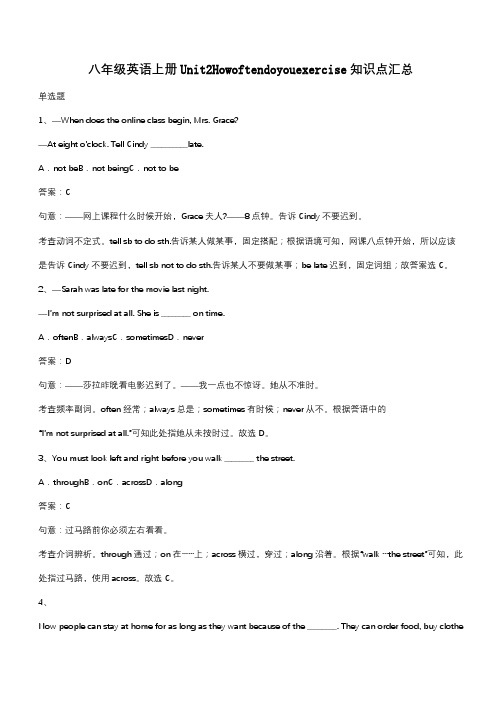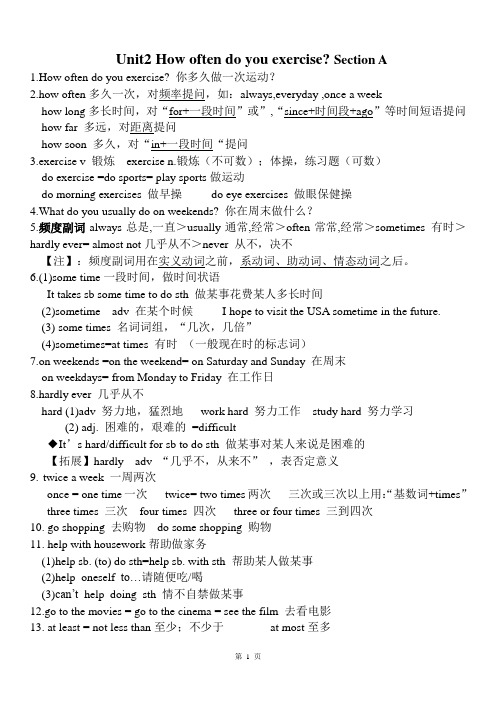八年级英语上册Unit2Howoftendoyouexercise短语语法知识点汇总
- 格式:docx
- 大小:22.91 KB
- 文档页数:12

八年级英语上册Unit 2 How often do you exercie?必背知识点一、词汇短语1. help with housework:帮助做家务2. go shopping:购物3. on weekends/at weekends:在周末4. how often:多久一次5. hardly ever:几乎不6. once a week/month:每周/月一次7. twice a week/month:每周/月两次8. go to the movies:去看电影9. every day:每天10. use the internet:上网/用网11. be free:有空12. have dance and piano lessons:上舞蹈和钢琴课13. swing dance:摇摆舞14. play tennis:打网球15. stay up late:熬夜16. at least:至少17. go to bed early:早睡18. play sports:锻炼身体19. be good for:对……有好处20. go camping:去野营21. in one’s free time:在某人的空闲时间22. not…at all:根本不23. the most popular:最流行24. such as:例如25. go to the dentist:去看牙医26. old habits die hard:旧习惯难改27. less than:少于/不到二、语法结构1. 频率副词:always, usually, often, sometimes, never 等,用于描述动作发生的频率。
2. “次数”的表达方法:一次once,两次twice,三次或三次以上用基数词+times,如three times,five times。
3. how often 引导的特殊疑问句:用于询问动作发生的频率,回答常含有频率词组或短语。

八年级英语上册Unit2Howoftendoyouexercise知识点汇总单选题1、—When does the online class begin, Mrs. Grace?—At eight o'clock. Tell Cindy __________late.A.not beB.not beingC.not to be答案:C句意:——网上课程什么时候开始,Grace夫人?——8点钟。
告诉Cindy不要迟到。
考查动词不定式。
tell sb to do sth.告诉某人做某事,固定搭配;根据语境可知,网课八点钟开始,所以应该是告诉Cindy不要迟到,tell sb not to do sth.告诉某人不要做某事;be late迟到,固定词组;故答案选C。
2、—Sarah was late for the movie last night.—I’m not surprised at all. She is ________ on time.A.oftenB.alwaysC.sometimesD.never答案:D句意:——莎拉昨晚看电影迟到了。
——我一点也不惊讶。
她从不准时。
考查频率副词。
often经常;always总是;sometimes有时候;never从不。
根据答语中的“I’m not surprised at all.”可知此处指她从未按时过。
故选D。
3、You must look left and right before you walk ________ the street. A.throughB.onC.acrossD.along答案:C句意:过马路前你必须左右看看。
考查介词辨析。
through通过;on在……上;across横过,穿过;along沿着。
根据“walk…the street”可知,此处指过马路,使用across。
故选C。
4、Now people can stay at home for as long as they want because of the ________. They can order food, buy clothes, have classes, ect.A.worldB.InternetC.supermarketD.restaurant答案:B句意:现在因为有了互联网,人们想待在家里多久就待多久。

八年级英语上册Unit 2 How often do you exercise知识点归纳八年级英语上册Unit 2 How often do you exercise知识点归纳一、词组、短语:1、help with housework 帮助做家务活,2、go shopping 购物,3、on weekends 在周末,4、how often 多久一次,5、hardly ever几乎不,6、once a week 每周一次,7、twice a month每月二次,8、go to the movies去看电影,9、every day 每天,10、use the Internet上网/用网,11、be free有空,12、have dance and piano lessons 上舞蹈钢琴课,13、swing dance摇摆舞14、play tennis 打网球,15、stay up late熬夜,16、at least至少,17、go to bed early 早睡,18、 play sports 锻炼身体,19、be good for 对…有好处,20、go camping去野营,21、in one’s free time 在某人的空闲时间,22、not….at all 根本不,23、the most popular 最流行,24、such as例如,25、go to the dentist去看牙医,26、more than 超过/多于,27、Old habits die hard.旧习惯难改。
28、 hard=difficult 困难的,29、less than 少于/不到二、重要句子(语法):What do you usually do on weekends你周末通常做什么 I always exercise.总是锻炼身体。
What do they do on weekends他们周末干什么 They often help with housework.他们经常帮助干家务活。

Unit2 How often do you exercise? Section A1.How often do you exercise? 你多久做一次运动?2.how often多久一次,对频率提问,如:always,everyday ,once a weekhow long多长时间,对“for+一段时间”或”,“since+时间段+ago”等时间短语提问how far 多远,对距离提问how soon 多久,对“in+一段时间“提问3.exercise v 锻炼exercise n.锻炼(不可数);体操,练习题(可数)do exercise =do sports= play sports做运动do morning exercises 做早操do eye exercises 做眼保健操4.What do you usually do on weekends? 你在周末做什么?5.频度副词always总是,一直>usually通常,经常>often常常,经常>sometimes 有时>hardly ever= almost not几乎从不>never 从不,决不【注】:频度副词用在实义动词之前,系动词、助动词、情态动词之后。
6.(1)some time一段时间,做时间状语It takes sb some time to do sth 做某事花费某人多长时间(2)sometime adv 在某个时候I hope to visit the USA sometime in the future.(3) some times 名词词组,“几次,几倍”(4)sometimes=at times 有时(一般现在时的标志词)7.on weekends =on the weekend= on Saturday and Sunday 在周末on weekdays= from Monday to Friday 在工作日8.hardly ever 几乎从不hard (1)adv 努力地,猛烈地work hard 努力工作study hard 努力学习(2) adj. 困难的,艰难的=difficult◆It’s hard/difficult for sb to do sth 做某事对某人来说是困难的【拓展】hardly adv “几乎不,从来不”,表否定意义9.twice a week 一周两次once = one time一次twice= two times两次三次或三次以上用:“基数词+times”three times 三次four times 四次three or four times 三到四次10.go shopping 去购物do some shopping 购物11.help with housework帮助做家务(1)help sb. (to) do sth=help sb. with sth 帮助某人做某事(2)help oneself to…请随便吃/喝(3)can’t help doing sth 情不自禁做某事12.go to the movies = go to the cinema = see the film 去看电影13. at least = not less than至少;不少于at most至多14. use the Internet 上网15.What’s your favorite program?=What program do you like best?你最喜欢的节目是什么?16.every day 每天= each day 做状语,放在句末,对其提问用how ofteneveryday = daily adj. 每天的,作定语,修饰名词,放在名词之前He exercises every day. 他每天都锻炼。

人教版八年级上册Unit 2 How often do you exercise?语法知识突破人教版英语八年级上册第二单元Unit 2 How often do you exercise 语法知识突破在英语学习中,语法学习,既是一个重点,也是一个难点,每个单元的设计都是围绕一定话题,突破语法和句子知识展开的。
接下来,我们来呈现一下人教版英语八年级上册第二单元的语法如何突破?从标题看语法本单元的标题是:How often do you exercise 从标题可以看出,本单元主要谈论“频率”问题,所以,话题就是“关于日常活动的频率”,既然是询问频率,就牵涉到关于如何询问频率?如何表达频率?等一系列的问题。
语法突破:如何询问频率?英语里面,当我们要询问对方“多久做一次某事”的时候,要用“how often”来询问频率,表示“多久一次”,例如:How often do you exercise 你多久锻炼一次?How often do they go out for a picnic 他们多久出去野炊一次?从Grammar focus看语法。
语法部分从基本句型”What do you usually do “引入,通过回答,给我们展示了频率副词always , often, sometimes等的用法。
接下来,用How often do you go to the movies 再次引出频率副词的用法以及如何表示“次数”。
让我们先看语法中的句子。
What do you usually do on weekends I always exercise.What do they do on weekends They often help with housework.What does she do on weekends She sometimes goes shopping.How often do you go to the movies I go to the movies maybe once a month.How often does he watch TV He hardly ever watches TV.Do you go shopping No , I never go shopping.当询问某人周末通常做什么的时候,用到频率副词usually,它的位置“be动词的后面,行为动词的前面”。

Unit2 how do you often exerciseSection A1. on weekends在周末weekend指星期六和星期天weekday工作日2. help with housework 帮忙做家务help (sb) with sth帮(某人)做某事,with后用名词【拓展】1) help sb (to) do sth 帮助某人做某事2) help (to) do sth 帮忙做某事3) help onese lf to… 请随便吃/喝···Please help yourself to some cakes. 请随便吃一些蛋糕吧。
4)can’t help doing sth 情不自禁做某事I can’t help falling in love with that girl. 我情不自禁爱上那个女孩。
3.【拓展】(1)这些副词在句子中的位置基本相同,一般放在助动词、be动词或情态动词之后,行为动词之前。
即:“行”前“助(系)”后。
Peter is always late for school. Peter上学总是迟到。
(2)hard、hardly和hardly everHe can hardly play football. 他几乎不会打篮球。
4、exercise (1)作不及物动词,意为“锻炼、运动”。
— How often do you exercise? 你多久锻炼一次?— I exercise every day. 我每天都锻炼。
(2)作不可数名词,意为“锻炼、运动”,常与动词take连用。
Exercise makes me keep healthy. 运动使我保持健康。
John likes take exercise in the open air. 约翰喜欢在户外锻炼。
(3)作可数名词,意为“练习;操”。
We do morning exercises every day. 我们每天做早操。
Unlt2 How often do you exercise?知识讲解Section A一. help with housework 帮助做家务1.help with sth.意为"帮助做某事"2.help sb. with sth. = help sb. ________ sth.帮助某人做某事Eg: I often help him _______ his English. = I often help him _____________ English.我经常帮他学习英语。
【拓展】1.help oneself to.., 请随便吃/喝…Please help yourself to some cakes.2.can't help doing sth 情不自禁做某事I can't help falling in love with that girl.我情不自禁爱上那个女孩。
二. housework意为''家务劳动不可数名词。
1.They have ______ housework to do. A. many B. much三. sometimes 有时辨析:sometimes » some times > sometime , some timesometimes 有时候。
=at times= from time to time 也是“有时''的意思。
some times几次。
time作可数名词时可作“次数"解:表示“时间"时是不可数名词。
sometime某个时候。
可指过去或将来的某个时候。
some time —段时间。
常与for连用。
对它提问用how long o口诀记忆:分开“一段时间”;相聚“某个时候气练习:①We plan to stay in Hainan for _________________ .我们打算在海南呆一段时间。
Unit2 How often do you exercise? 知识点总结一、单词和短语1.How often......? 多久一次?How often 常对every day,always,usually,often,sometimes,hardly ever,never,once a week,twice 等表示频度副词或短语进行提问。
2.help v./n. 帮助A.作动词,相关短语:①.help sb. with sth. 在某方面帮助某人②. help sb. (to) do sth. 帮助某人做某事③. help oneself to sth. 请自便④.can’t help doing sth. 情不自禁做某事Eg. My brother helps me with my English. = My brother helps me learn English.我的弟弟帮我学习英语。
He can’t help crying when watching the love movie. 他看这个爱情电影时情不自禁哭了。
Please help yourself to the drinks. 请自取饮料酒水。
3.4.5.频度副词频率排序:always>almost always>usually>often>sometimes>seldom>hardly ever>almost never>never6.once 副词,一次;曾经;一旦A.作副词,意为“一次”,表示频率,常用来回答how often的提问。
Eg. —How often do you go shopping? —Once a week.B.作副词,意为“曾经”,表时间,常与一般过去时连用。
Eg. He once lived in Beijing,China. 他曾经住在中国北京。
Unit2 How often do you exercise?一、重点短语help with housework 帮助做家务 on weekends 在周末how often 多久一次 hardly ever 几乎从不once a week 每周一次 twice a month 每月两次be free 有空 go to the movies 去看电影use the Internet 用互联网 swing dance 摇摆舞play tennis 打网球 stay up late 熬夜;睡得很晚go to bed early 早点睡觉 play sports 进行体育活动be good for 对……有好处 go camping 去野营not…at all 一点儿也不…… in one’s free time 在某人的业余时间the most popular 最受欢迎的 such as 比如;诸如old habits die hard 积习难改 go to the dentist 去看牙医more than 多于;超过 less than 少于at least 至少 have dance and piano lessons 上舞蹈课和钢琴课二、句型荟萃help sb. with sth. 帮助某人做某事How about…? ......怎么样?/ ……好不好?want sb. to do sth. 想让某人做某事How many+可数名词复数+一般疑问句?…有多少…?主+find+ that从句. ……发现……spend time with sb. 和某人一起度过时光It’s+ adj.+ to do sth. 做某事是……的。
ask sb. about sth. 向某人询问某事by doing sth. 通过做某事What’s your favorite……? 你最喜爱的…是什么?the best way to do sth. 做某事的最好方式三、单元语法频度副词1.频度副词:表示动作发生间隔(既频率)的副词。
人教版初二英语八年级上册Unit2知识点Unit2 How often do you exercise?【重点语法】1. 频率副词: always,usually, often, sometimes, never频率副词在句中通常放在实义动词之前, be动词或助动词之后。
常用于一般现在时态中。
2.“次数”的表达方法一次once,两次twice,三次或三次以上:基数词+ times, 如:three times, five times,3. how often“多久一次”问频率,回答常含有频率词组或短语。
常见的how疑问词:1)How soon 多久(以后)—How soon will he be back?他多久能回来?—He will be back in amonth. 他一个月后能回来。
2)how long “多久”—How long did it take you toclean the house? 你打扫房子用了多久?—It took me half an hour to cleanthe house. 我打扫这房子用了半小时。
3)How many+名复How much+不可名“多少” 问数量(how much 还可问价格)【重点短语】1. go to the movies 去看电影2. look after = take care of 照顾3. surf the internet 上网4. healthy lifestyle 健康的生活方式5. go skate boarding 去划板6. keep healthy=stay healthy 保持健康7. eating habits 饮食习惯8. take more exercise 做更多的运动9. the same as 与什么相同10. be different from 不同11. once a month一月一次12. twice a week一周两次13. make a difference to 对......有影响/作用14. most of the students=moststudents15. shop=go shopping=do someshopping 购物16. be good for 对......有益17. be bad for 对......有害18. come home from school放学回家19. of course = certainly = sure 当然20. get good grades 取得好成绩21. keep/be in good health 保持健康22. take a vacation 去度假【词语辨析】1.maybe / may bemaybe 是副词,意为“大概,可能,或许”,一般用于句首。
八年级英语上册Unit2Howoftendoyouexercise短语语法知识点汇总Unit 2 How often do you exercise一、必背短语。
1.去看电影gvies2.多久一次how几乎从不hardly ever4.在周末weekend/on weekends5.一周一次once a week6.一周两次twice a week7.一个月三次a使用互联网u充满…be full of10.上钢琴课have piano l不得不做某事have to d2.帮助做家务help with housew至少at least14.至多a保持健康althy/good health16….的结果ult of…17.百分之二十tw对…有益be good for…19.对…有害be bad for20.垃圾食品junk food21.多少个小时how many hours22.做运动play/d23.在某人空闲时间’24.根本不;一点也不not…at all25.询问…关于…ask…about26.熬夜stay up late27.一个16岁的男孩a 16-year-old boy28.超过、多于an29.少于less than30.放松的最好方式the best way to relax【教材内容解析】A1.What do you usually do on weekends? (P. 9)on weekends意为“在周末”,泛指每个周末,on the weekend则表示“在这个周末”,特指某个周末;在英式英语中,在周末也可以用at the weekend或者at weekends。
I like going fishing on weekends.He wants to dg specialweekend.2.helpwwork (P. 9)help表示“帮助”时,常用的句型为:help sb. w帮助某人某事;help sb. (to) do sth. 帮助某人做某事。
Can you help me wwork?Hllean do housew(P. 9)是频度副词,意为“有时”,相当于at times。
Ilay computer games on weekends.【拓展】辨析与有时ad lunch at school几次、几倍I’ve buseu某时I will visit Damingummer vaca一段时间She has livedardlyever (P. 9)hardly作副词,表示“几乎不”;hard用作副词表示“努力地、猛烈地”,作形容词表示“硬的、困难的”。
He hardly works.He works hard.This is a hard work.5.How oftendo you watch TV?(P. 9)how often意为“多久一次”用来提问频率,常用表示频率的副词或者短语来回答,如twice a wvery day, always等。
-How often do you pla?-Ta week.【拓展】辨析how long, how soon和howw long“多长时间”,提问for和since引出的时间状语---How long did you stay there?---For abo ut two ww“多久”提问“in+一段时间”---How soon willback?---In two ww“多久一次”,提问动作发生的频率---How often do you go home?---Once a ww far“多远”,提问距离的远近---How faul?---Three kiluse the Internet(P. 10)Internet作名词,表示“互联网、因特网”,常用的短语为:on the Internet“在互联网上”;surf the Internet“上网”。
You can find much useful informaIudents like surfing the IHi, Claire, are youxt week? (P. 10)free作形容词表示“空闲的、有空的”,be free相当于have time。
I will bxt week.=I will havx【拓展】free作形容词,还可以表示“免费的、自由的”,bdo sth.“自由地做某事”。
Tau aand go.8.How come?(P. 10)How come意为“为什么呢、怎么回事”,用于询问某事为什么会发生,可以单独使用也可以后接陈述句。
Howu didn’t waa while?9.Well, how aboutTuesday? (P. 10)How about相当于what about意为“怎么样”,用来征求对方意见或者询问情况,后接名词或者动名词。
It’s sunny today. How/What about playing tennis?10.Oh, I have toplawds. (P. 10)have to表示“不得不、必须”,强调客观需求;must侧重主观上自己认为有必要做某事。
It is getting dark. I have to gw.We must caur paI gvies maybeonce a month.(P. 11) maybe作副词,表示“可能、也许”,常常放在句首,可以与may be相互转换。
Mayba foreigner.=He may be a foreigner.12.How often day uplate? (P. 11)stay up意为“熬夜”,表示“为……熬夜”时,用“stay u”。
It is a bad habay up late.13.He plays at leasttwice a week.(P. 11)at least表示“至少”,反义词为at most“最多”。
There are at least 10,000 studur school.He can caboxes aBays it’s goodalth. (P. 12)(1)be good for意为“对……有益”,反义词是be bad for“对……有害”。
Doinggood for you.(2)health是不可数名词,意为“健康”,in good health表示“很健康”,形容词为healthy,副词是healthily。
Talthy, you should eat healthily.we askedour students abouactivities. (P. 13) ask sb. about sth.意为“询问某人某事”。
asking Lucy about the wonderful building.3.Here aults. (P. 13)here和there置于句首,谓语动词是be动词或者come, go等不及物动词时,主语为名词时,用倒装结构,即主谓调换位置,若主语是代词时,主谓不倒装。
Hbus.Tgoes.4.We found that onlur students exvery day. (P. 13)表示“百分之……”,常用“基数词+percent+of+名词”,“+名词”作主语时,谓语动词的单复数取决于名词的单复数。
Sevboys like playing computer games.Nwd.5.And twdo notexercise at all!(P. 13)not...at all意为“一点儿也不、根本不”;not at all 表示“没关系、不用谢”。
I don’t know about it at all.---Thank you very much.---Not at all.6.We all know that many studgo online...(P. 13) 此处online用作副词,表示“在线、联网”,也可以用作形容词,意为“在线的、联网的”。
Many people like buying things online.The online games are popular with children.7.The answur questionsabout watching television were alg. (P. 13)名词answer后常跟介词to,表示“……的答案”,类似的名词还有key,solution,ticket。
Your answqught.8.Althoughmany students like to wagame shows aular. (P. 13)although用作连词,表示“虽然、即使”,相当于though,用来引导让步状语从句。
在英语中,although/though和but不能同时出现。
Although it rained heavily, the boys played outside. =It rained heavily, but the boys played outside.9. It is good to relax byusing the Iwatching game shows, but wbest way to relaxis through ex(P. 13) (1) by可以用来表示方式,意为“通过”,后接名词或者动名词短语。
He usually goes to work by bus.The man makes a living by selling newspapers. (2) way表示“方法”时,后常接动词不定式或者of doing作定语。
Can youut a wadoor/g the door?10. Exuch asplayingun, and you can spendtime with your friends and family as you play together. (P. 13) (1) such as一般用于列举同一类人或物中的一个例子,但必须数量少于前面所提及的总数,只能放在所列举的名词前;for example一般用于列举一个例子,后面经常加上一个句子,位置很灵活,可位于句首、句中,于被列举的事例之间用逗号隔开。
I like fruit; for example, Iat bananavening.He knows several languages, such as English and(2) sb. spend+时间/金钱+“在某事上花费多长时间或者多少钱”; sb. spend+时间+(in) doing sth.“花费多长时间做某事”The mawhole daThe famil0,000 dollaThe boy hawo hours playinguter games.【拓展】辨析spend, pay, take和d主语是人spend/spend...(in) doingay主语是人pa/pay +金钱ake主语是itIt takes sb.+时间+to d主语是物b.+金钱11. Jane is a 16-year-oldhigh school studUnited States. (P. 15)16-year-old意为“16岁的”,其中的名词用单数形式,在句中作定语,16 years old表示“16岁”,在句中作表语。